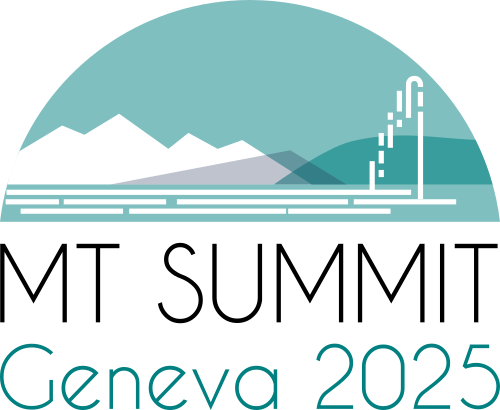
The MT Summit brings together researchers, developers, and language industry professionals to focus on machine translation. First held in 1987 in Japan, the MT Summit is organized biennially, alternating between different continents. This year will mark its twentieth edition and the seventh in Europe, following previous conferences in Munich (1989), Luxembourg (1995), Santiago de Compostela (2001), Copenhagen (2007), Nice (2013), and Dublin (2019).
The conference will span five days, including two days dedicated to workshops and tutorials. The main conference will feature four tracks: research/technical, research/translators and users, implementations and case studies, and products and projects.
Organising committee
General Chair
Helena Moniz (University of Lisbon, Portugal)
Track Chairs
Research: Technical
Catarina Farinha (Unbabel)
Marco Gaido (Fondazione Bruno Kessler, Italy)
Research: Translators and Users
Joke Daems (Ghent University, Belgium)
Dorothy Kenny (Dublin City University, Ireland)
Implementations and Case Studies
Samuel Läubli (Textshuttle/Supertext, Switzerland)
Martin Volk (University of Zurich, Switzerland)
Products and Projects
Miquel Esplà-Gomis (University of Alicante, Spain)
Vincent Vandeghinste (KU Leuven, Belgium)
Workshops and Tutorials
Sheila Castilho (Dublin City University, Ireland)
François Yvon (Sorbonne University, France)
Local Coordinators
Pierrette Bouillon (University of Geneva, Switzerland)
Sabrina Girletti (University of Geneva, Switzerland)
Lise Volkart (University of Geneva, Switzerland)
Local Organising Team
Sevita Caseres (University of Geneva, Switzerland)
Céline De Graaf (University of Geneva, Switzerland)
Johanna Gerlach (University of Geneva, Switzerland)
Julie Humbert-Droz (University of Geneva, Switzerland)
Rebeka Mali (University of Geneva, Switzerland)
Lucía Morado (University of Geneva, Switzerland)
Jonathan Mutal (University of Geneva, Switzerland)
Lucía Ormaechea (University of Geneva, Switzerland)
Aurélie Picton (University of Geneva, Switzerland)
Donatella Pulitano (University of Geneva, Switzerland)
Silvia Rodríguez (University of Geneva, Switzerland)
Raphaël Rubino (University of Geneva, Switzerland)
Rico Sennrich (University of Zurich, Switzerland)
Marianne Starlander (University of Geneva, Switzerland)
Nikolaos Tsourakis (University of Geneva, Switzerland)
Florine Voisard (University of Geneva, Switzerland)
Code of conduct
The EAMT adheres to the ACM Code of Ethics, the ACL’s anti-harassment policy, and the ACL Code of Conduct (adapted below). By registering, participants acknowledge and agree to follow these policies, and violations against them should be reported to the EAMT executive committee.
EAMT Code of Conduct (adopted from *ACL conferences)
The open exchange of ideas, the freedom of thought and expression, and respectful scientific debate are central to the aims and goals of the EAMT. These require a community and an environment that recognizes the inherent worth of every person and group, that fosters dignity, understanding, and mutual respect, and embraces diversity. For these reasons, we are dedicated to providing a harassment-free experience for all the members, as well as participants at our events and in our programs.
Harassment and hostile behavior are unwelcome at any EAMT conference, associated event, or in EAMT-affiliated online discussions. This includes: speech or behavior that intimidates, creates discomfort, or interferes with a person’s participation or opportunity for participation in a conference or an event. We aim for our activities to be an environment where harassment in any form does not happen, including but not limited to: harassment based on race, gender, religion, age, color, appearance, national origin, ancestry, disability, sexual orientation, or gender identity. Harassment includes degrading verbal comments, deliberate intimidation, stalking, harassing photography or recording, inappropriate physical contact, and unwelcome sexual attention. The policy is not intended to inhibit challenging scientific debate, but rather to promote it by ensuring that all are welcome to participate in the shared spirit of scientific inquiry. Vexatious complaints and willful misuse of this procedure will render the complainant subject to the same sanctions as a violation of the anti-harassment policy.
It is the responsibility of the community as a whole to promote an inclusive and positive environment for our scholarly activities. In addition, anyone who experiences harassment or hostile behavior may contact any member of the EAMT executive committee. Members of this committee will be instructed to keep any such contact in strict confidence, and those who approach the committee will be consulted before any actions are taken.